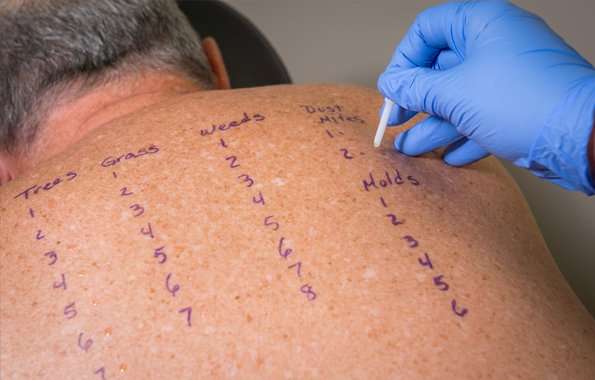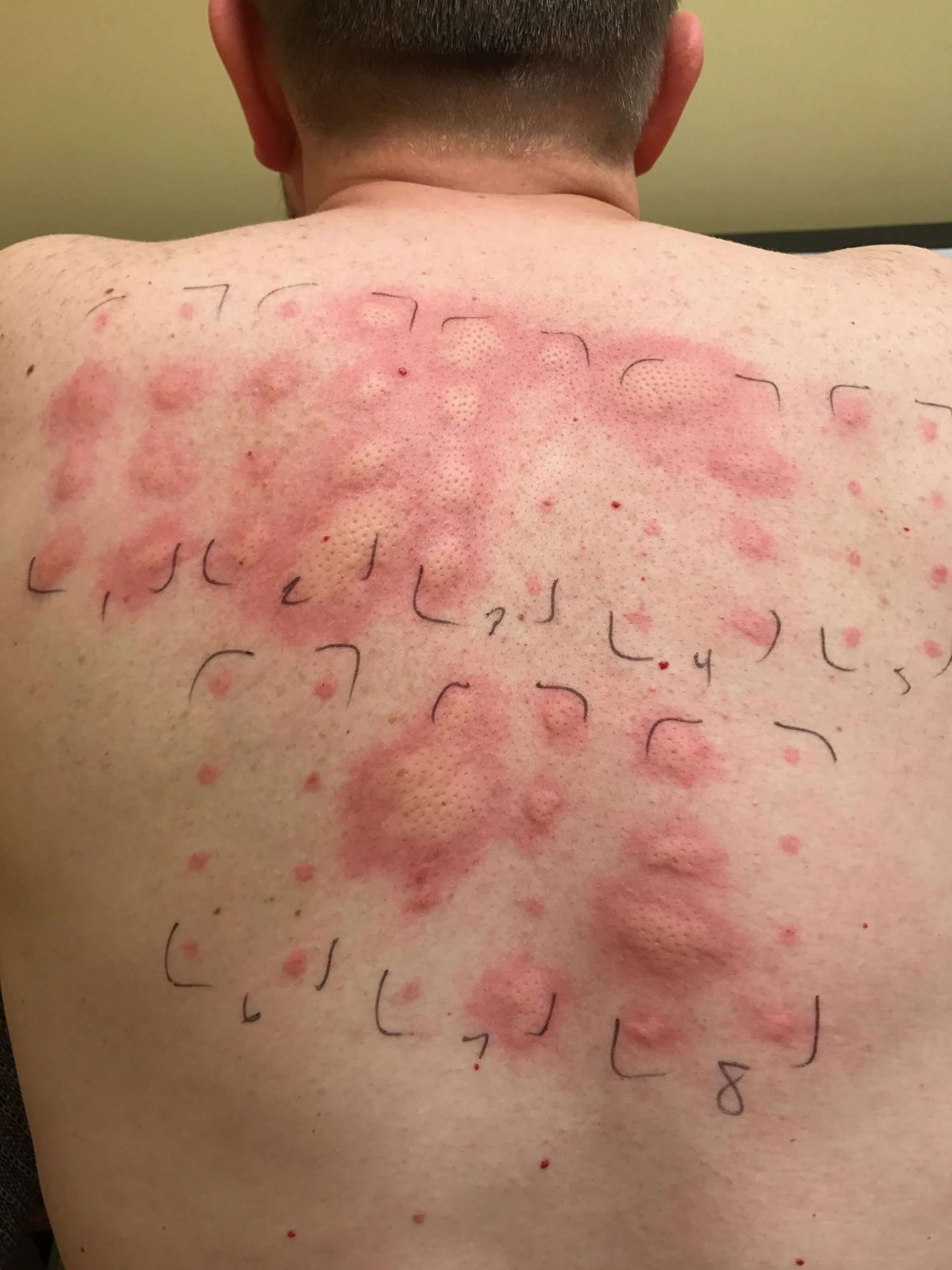What Happens During An Allergy Test
If your doctor thinks you might have an allergy, youll probably go see an allergist for testing.
Here’s what to expect. The allergist will ask questions like:
- What symptoms do you notice when you have a reaction?
- How often does the reaction happen?
- How long does it take between eating a particular food and the start of the symptoms?
- Do any family members have allergies or conditions like eczema and asthma?
The allergist will also do tests. Skin tests are a common way to diagnose allergies.
What Happens If A Test Shows An Allergy
If you do have an allergy, the doctor will work with you on a plan to keep you safe. Treatment depends on the allergy for people with environmental allergies, this might mean avoiding triggers that make symptoms worse, taking medicine, or getting allergy shots. For a food allergy, the doctor will help you learn how to avoid foods that arent safe for you. The doctor will also give you a prescription for emergency medicine called to keep with you all the time in case of a severe allergic reaction.
Can I Have A Test For Lactose Intolerance
Yes, but a food intolerance is not the same as an allergy, so the tests are completely different.
In people with allergies, the immune system interprets normal substances as harmful and releases attacking chemicals like histamine. In people with food intolerances, the body simply has trouble digesting a specific substance.
In the case of lactose intolerance, the issue is normally a lack of lactase. This is an enzyme that helps your body to break down lactose . Rather than being broken down into glucose and galactose in the small intestine, the lactose is broken down in the colon. This process releases acids and gases that cause bloating, flatulence, and diarrhoea.
A test for lactose intolerance may not be needed your GP may simply advise that you cut dairy from your diet for a couple of weeks to see if your symptoms improve. Sometimes they may want to do some tests to check:
- how much hydrogen is in your breath people with lactose intolerance produce more hydrogen than normal
- your blood glucose levels after drinking milk or a lactose solution your glucose levels will not be affected, or will rise very slowly, if you have lactose intolerance
Your GP may want to do different tests if they suspect that something else is causing your symptoms. Conditions like irritable bowel syndrome can cause similar symptoms, as can an intolerance to the protein in cows milk.
You May Like: Switching From Zyrtec To Claritin
Is There Anything Else I Should Know
Sometimes, a healthcare practitioner will look at other blood tests for an indirect indication of an ongoing allergic process, including a total IgE level or a complete blood count and white blood cell differential . Increases in these test results may suggest an allergy, but they may also be elevated for other reasons.
Allergy Testing Doctors Near Maryland

More than 50 million people in the United States have allergies. Finding out what you are allergic to is an important first step to effective allergy treatment. Today, allergy tests are more convenient and accurate than ever before. When combined with a detailed medical history, our team at Premier Allergist can identify the specific things that trigger your allergic reactions. If youre ready for relief from your allergies, schedule an appointment with us today.
Recommended Reading: Robitussin Cough Suppressant And Expectorant
So When Should You Have Allergy Tests
If you have allergy symptoms, you may get relief from self-help steps and over-the-counter drugs. If these steps do not help your symptoms, then it is time to see your doctor.
The doctor should ask you about your medical history and make sure you get the right tests. If your medical history suggests that you have an allergy, your doctor might refer you to an allergist or immunologist for testing.
- A skin test is the most common kind of allergy test. Your skin is pricked with a needle that has a tiny amount of something you might be allergic to.
- If you have a rash or take a medicine that could affect the results of a skin test, you may need a blood test.
- For chronic hives, you usually do not need an allergy test. However, your doctor might order tests to make sure that the hives are not caused by other conditions, such as a thyroid disorder.
This report is for you to use when talking with your healthcare provider. It is not a substitute for medical advice and treatment. Use of this report is at your own risk.
07/2012
Which Allergy Test Is Best
The AAAAI says that there are four types of allergy tests:
- Skin tests
- Blood tests
- Challenge tests
Your allergist will likely recommend the most common type, skin testing. This involves applying a small amount of allergen to an area of your skin that is pricked or scratched to see if a reaction occurs. If you react to the allergen, the area will experience some swelling and itchiness.
In his practice, Dr. Kleiner typically relies on skin tests first, possibly followed by a blood test if more information is needed.
In terms of looking at the symptoms, the skin tests give us a yes or no answer as to whether you are allergic, he says. More advanced blood tests for food allergies give us a little more information about the seriousness of the allergy. It also helps us with counseling and education.
If he suspects a food allergy, Dr. Kleiner will typically use a challenge test as well. These involve having the patient eat or inhale a tiny amount of a suspected allergen in the controlled setting of the doctors office, with rescue medication present.
This provides the family and the allergist with more information in a safe setting to move forward with a diagnosis.
Read Also: Green Allergy Pill
Is There Anything Else I Need To Know About Food Allergy Testing
The best way to prevent an allergic reaction is to avoid the food you are allergic to. But there are some new therapies which might help prevent a severe reaction if you are accidentally exposed to the food you are allergic to. These include:
- Oral immunotherapy . This involves eating a small amount of an allergy-causing food and gradually increasing the amount. The goal of this therapy is to increase the amount of food that can be eaten before causing an allergic response.
- Epicutaneous immunotherapy . This is similar to OIT, but instead of eating a certain food, a protein from that food is delivered through a skin patch. The patch is replaced daily with increasing larger amounts of the protein.
Both OIT and EPIT are always done under close medical supervision. To learn more about these approaches, talk to your allergist.
Learn more about laboratory tests, references ranges, and understanding results.
Can Dogs Get An Allergy Test
Allergy testing in dogs can be performed using two techniques: intradermal skin testing or RAST testing. Each method has its own pros and cons. While intradermal skin testing has long been regarded as the gold standard in determining the cause of atopic dermatitis, it is only performed by veterinary dermatologists.
How much does it cost to do an allergy test on a dog? How Much Is A Dog Allergy Test At A Vets Office? Pricing varies by your vet and location, but in general, you can expect to pay an average of $200 for a skin test and $200-$300 for a blood test.
How accurate are allergy tests for dogs? Skin allergy testing for dogs has been estimated to be upwards of 75% accurate in determining the presence of dog allergies. However, skin allergy tests can be inaccurate if patients have received antihistamines or steroids in the months leading up to testing.
You May Like: Claritin Allergy Pill
Signs Of Allergies In Kids
Allergic reactions can happen anywhere in the body, but the most common locations are the skin, eyes, stomach, nose, sinuses, throat, tongue, and lungs. Normally, these parts of the body are where the immune system cells are located. Their primary job is to fend off viruses and bacteria that are inhaled, swallowed, or that come in contact with the skin.
With allergies, the body’s immune system believes things like pollen, dust, fragrances, medications, or food are a threat to the body and initiate a histamine response. In return, the person experiences an allergic reaction.
“The most important thing for parents to know is that the symptoms that often occur with allergies commonly occur from many unrelated causes,” says David Stukus, MD, professor of clinical pediatrics in the division of allergy and immunology at Nationwide Childrens Hospital. “That is why it is always important to not self-diagnose allergies and to seek proper evaluation to clarify the diagnosis, as management can vary greatly depending upon the cause.”
It is also important to note that no one person responds to an allergen in exactly the same way. Some kids may have one or two symptoms while others will have a multitude of symptoms. Likewise, some kids will have a mild allergic reaction to an allergen while others may have a life-threatening responseparticularly to food, drugs, or bee stings.
How Does A Skin Test Work
There are two different types of allergy skin tests performed at Ogden Clinic: prick-puncture tests and intradermal tests. The prick puncture test introduces allergens to the skin superficially, while an intradermal test involves injecting a small amount of allergen into the skin with a needle.
For an accurate reading, patients must discontinue any antihistamines they are taking prior to their allergy skin test at Ogden Clinic. During the test, your allergy specialist will prick or inject the skin with each allergen individually. It doesnt take long to find out what is triggering your allergies reactions tend to develop in about 20 minutes.
If the skin becomes inflamed or develops a bump during your Ogden allergy skin test, the reaction is recorded as an allergen. After all allergens have been tested, your allergy specialist will interpret your results and share them with you. Once you know exactly what youre allergic to, your Ogden ENT specialist can help you develop a treatment plan to reduce or eliminate your symptoms.
Select providers are now using Telemedicine.VisitTelemedicine to see if your next visit can take place over video chat.
Related Providers
You May Like: Allergic To Claritin
What Meat Should Dogs Avoid
Bacon, Ham and Fat Trimmings Bacon, bacon grease, ham, and fat trimmed off meat or bones contains a lot of salt and/or fat and at the least can cause indigestion, vomiting, and diarrhea in both dogs and cats. These foods can also cause pancreatitis, a serious, potentially deadly inflammation of the pancreas.
What Is Allergy Testing

Healthcare providers perform allergy tests to determine whether your immune system overreacts to certain substances . If you have an allergic reaction, it means you have an allergy.
People can be allergic to things in the environment like mold, pollen and pet dander. Some people have allergic reactions to bee stings or latex. People with food allergies may not be able to tolerate peanuts, milk or soy.
Recommended Reading: Allergy Medication Non Drowsy
Unreliable Test Results Can Lead To Unnecessary Changes In Your Lifestyle
If the test says you are allergic to some foods, such as wheat, soy, eggs, or milk, you may stop eating those foods. You may end up with a poor diet, unnecessary worries and frustration, or extra food costs. If the test says you are allergic to cats or dogs, you may give up a loved pet.
And tests for chronic hivesred, itchy, raised areas of the skin that last for more than six weekscan show something that may not look normal but is not a problem. However, this can lead to anxiety, more tests, and referrals to specialists.
What Do The Results Mean
If the results show that you or your child has a food allergy, the treatment is to avoid the food.
There is no cure for food allergies, but eliminating the food from your diet should prevent allergic reactions.
Avoiding allergy-causing foods can involve carefully reading labels on packaged goods. It also means you need to explain the allergy to anyone who prepares or serves food for you or your child. This includes people like waiters, babysitters, teachers, and cafeteria workers. But even if you are careful, you or your child may be exposed to the food by accident.
If you or your child is at risk for a severe allergic reaction, your allergist will prescribe an epinephrine device you can use if accidentally exposed to the food. You’ll be taught how to inject the device in your or your child’s thigh.
If you have questions about your results and/or how to manage allergic complications, talk to your allergist.
Also Check: Histamine Effect On Lungs
Allergy Tests Without A Doctors Exam Usually Are Not Reliable
Many drugstores and supermarkets offer free screenings. And you can even buy kits to test for allergies yourself at home. But the results of these tests may be misleading.
- The tests may say you have an allergy when you do not. This is called a false positive.
- These free tests and home tests for food allergies are not always reliable.
After The Allergy Test
Once youve had your food allergy testing and the results are in, what happens? Youll meet with your doctor to go over the results within the context of your medical history. The doctor wont only focus on the allergens that you reacted to in your tests, but how these allergens relate to your medical history.
Patients who rarely come into contact with a specific food may have a reaction similar to that of an allergy because their bodies are not used to food. However, if you have never had symptoms after eating that food, its likely that this is a false positive. Using your medical history, the doctor will be able to determine which allergens are false positives and which are real allergies.
Together, you and your doctor can come up with an effective treatment plan to make your life easier. This may include figuring out how to avoid certain foods that youre allergic to or introducing allergy medications to help manage your more moderate symptoms. And of course, if you have a severe allergy that could lead to anaphylactic shock, your doctor will educate you about the warning signs and effects of this, as well as teach you how to use an epi-pen.
You May Like: Latex Allergies And Foods To Avoid
Why Are Dogs Allergic To Chicken
If the digestive system doesnt completely break down the proteins, the enterocytes see them as intruders and attack the body. An allergy to poultry is an over-reaction of your dogs immune system to an unwelcome protein, in this case, a poultry protein, that is present in a particular ingredient of their diet.
When Should You Get An Allergy Test
Stay up to date with the latest medical news and research at UHealth.
For the 40 to 50 million people in the U.S. with allergies or asthma, relief can be hard to come by. Over-the-counter medications can sometimes relieve basic seasonal allergy symptoms, but that may not always be the case. If sneezing, sniffles, itchiness, or even more severe symptoms are causing concerns, the American College of Allergy, Asthma & Immunology says your best bet is to go see an allergist.
Don’t Miss: Robitussin Allergy-cough Syrup
Allergy Testing Near Me
Getting an allergy test is quick and easy with Solv. Find and book same day and next day appointments at participating local providers. You could be in and out in under an hour and have your allergy test results available before you leave.
Own a clinic? Add your location.
Help patients book appointments with you on Solv. It’s free!
We’re still growing
We could not locate you, please use the form above to find Allergy Testing locations near you.
Own a clinic? Add your location.
Help patients book appointments with you on Solv. It’s free!
Are There Any Risks To The Test

An oral challenge test can cause a severe allergic reaction. That’s why this test is only given under close supervision by an allergist.
You may get an allergic reaction during an elimination diet. You should talk to your allergist about how to manage potential reactions.
A skin prick test can bother the skin. If your skin is itchy or irritated after the test, your allergist may prescribe medicine to relieve the symptoms. In rare cases, a skin test can cause a severe reaction. So this test must also be done under close supervision by an allergist.
There is very little risk to having a blood test. You may have slight pain or bruising at the spot where the needle was put in, but most symptoms go away quickly.
Also Check: Prednisone And Penicillin
What Does The Test Result Mean
An elevated allergen-specific IgE result indicates that the person tested likely has an allergy. However, the amount of specific IgE present does not necessarily predict the potential severity of a reaction. A person’s clinical history and additional medically-supervised allergy tests may be necessary to confirm an allergy diagnosis.
Negative results indicate that a person probably does not have a “true allergy,” an IgE-mediated response to the specific allergens tested.
Results of allergy blood testing must be interpreted with care. False negatives and false positives can occur. Even if an IgE test is negative, there is still a small chance that a person does have an allergy. Similarly, if the specific IgE test is positive, a person may or may not ever have an actual physical allergic reaction when exposed to that substance.

